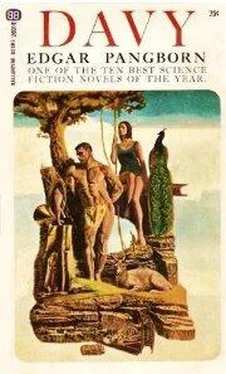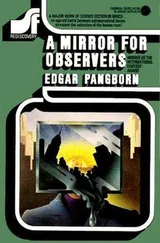Captain Barr had smelled danger and got us reefed down just enough, ready as a race-horse; he didn’t bother calling up the off watch.
I remember that square dark block of man at Provintown Island in 327, for I was there when the Hawk burned at her moorings. We’d gone ashore to accept the pirates’ surrender and take formal possession of all the Cod Islands in Nuin’s name. The fire may have been started by a spark from the galley stove. Sir Andrew’s face hardly shifted a muscle when the red horror rose out there and roared across her decks. Dying inside, he turned to us and remarked: “I think, gentlemen, we’d be well advised not to exaggerate our difficulties.” When Sir Andrew Barr dies for the last time it will be with some stately comment like that, pronounced so cleanly you can hear each punctuation mark click into the right place. If the pirate boss, old B ally-John Doon, had nourished any notion of taking advantage of the fire it must have perished at those words; after the Hawk’s survivors swam ashore and were cared for the ceremony proceeded just as planned.
In 322, the first year of the Regency, Barr was already dreaming of a strong ship rigged entirely fore-and-aft. The dream grew out of a diagram in a magnificent book at the underground library of the secret society of the Heretics — an Old-Time dictionary. We have it on board. The front cover and some of the introductory pages are missing; the borders carry the scars of fire, and on the brittle sheet that now begins the book there’s a brown stain. I think someone bled after rescuing it from a holy bonfire, but make up your own story. Sparked by the diagram, Barr searched out more information on Old-Time shipbuilding — all he could get — until through the Heretics he made contact with Dion and his conception was embodied in the building of the Hawk , and later the Morning Star .
When it was clear, in the last days of General Salter’s rebellion, that we would probably lose the final battle for Old City , we divided the books with the brave handful of Heretics who elected to remain. And we did lose the battle, and fled aboard the Morning Star — suburbs ablaze, stench of hatred and terror in all the streets — a hard decision, I suppose harder for Dion than for the rest of us. The dictionary was almost necessary for us; I can’t think of any one book that would give us more.
Those Heretics who remained were not all of them older people. A good number of the young stayed on, having some love and hope for Nuin in spite of everything. Theirs was the greater risk. We are only venturing on the unexplored; they dared to stay in a country that will again be governed by men who believe themselves possessed of absolute truth.
Captain Barr trusts our spread of eager canvas as no landsman could, and knows the sea in something like the way I knew the wilderness when I was a boy. A relentless perfectionist, he calls the Morning Star a beginner’s effort. It doesn’t conceal his love for her, which I think exceeds any he ever felt for a woman. He never married, and won’t bed with a girl who might demand permanence.
That evening when the storm cut loose Nickie and I weren’t expecting the universe to turn upsydown, so we got caught bare-ass innocent. I don’t think she minded, after prying my elbows loose from her knees. [7] That was easy — all I had to do was give you a bust in the face. — Dma. Miranda Nicoletta St. Clair-Levison de Moha.
Of course now that she’s taken to signing her full name and title of nobility I can see there’ll be no dull times ahead. (Dma. stands for “Domina”, which is what you call a lady of the Nuin aristocracy, married or single.) Already I’ve learned that when I come back to this manuscript after any absence it’s best to examine it, the way a dog searches himself after associating with mutts who may have a difterent entomological environment. I got “entomological” out of the Old-Time dictionary and I find it beautiful. It means buggy.
That wind blew until the following afternoon, shrill continuous wrath. On my watch I had the wheel. I’m happy then in any weather, overcoming the impulse of the wheel toward chaos, my own strength and its demand for order enough but only just enough, and under me a hundred tons of human creation straining forward against space and time. You may have your horses; I say there’s no poem like a two-masted schooner, and I’ll hope to ride a ship now and then until I am too old to grip the spokes, too dull of sight to read the impersonal assurance of a star.
That day of wind, Second Mate Ted Marsh had to transmit orders by waving his hands or bringing his mouth next to my ear. Few orders needed, though. We could do no more than run before it under jib and storm-sail, and so we did, taking no harm. Next morning the uproar was spent: we were creeping, and a few hours later becalmed. We still are. The wind had spat us out into a quiet, and fog claimed us. It lies around us now, the ocean hushed as if we had come to a cessation of all endeavor, motion, seeking, a defeat of urgency by silence. The sea level is not what it was when our Old-Time maps were made. The earth has changed, and those who live on it. There’s been no man sailing here since before the Years of Confusion.
Tonight our deck lanterns probe a few yards. From our cabin I hear fog-damp dripping off limp canvas. The animals are all quiet — chickens and sheep and cattle aslumber I suppose, and never a bray from Mr. Wilbraham penned aft with his two jennies who are expected to love him if anyone can; even the pigs have apparently knit up the ravell’d squeal of care. Nickie too has gone sweetly to sleep — truly asleep: she can’t prevent a quiver of the black eyelashes when she’s shamming. [8] Beast! No respect for Shakespeare. Classifies his wife with the rest of the livestock, no special privileges. Rips the veil from her most intimate deceptions. A beast. I’m going to walk home. — Nick.
She said a few hours ago that she doesn’t feel oppressed by the fog but has a notion it might conceal something pleasant, an island for instance.
I intended when I began this book to tell events in the order they happened. But when I woke this morning in the fogbound hush I fell to brooding over the different varieties of time. My story belongs in four or five of them.
So does any story, but it seems to be a literary custom that one kind should dominate, the others being suppressed or taken for granted. I could do that, and you who may exist might be too cloth-headed or stubborn or to busy keeping the baby out of the molasses to feel anything missing, but I’d feel it.
There’s the stream of happenings I picked up a little after my fourteenth birthday. Call that the mainstream if you like; and by the way, I shall have to make it flow a little faster soon, since I haven’t the patience for a book seven or eight million words long. Besides, while it’s possible you exist, if I confronted you with a book like that, you might weasel out of it by claiming you don’t.
There’s the story I live (pursued by footnotes) as this ship journeys toward you — unless the journey’s already ended: I saw no hint of a wake when I was on deck, the sails hang spiritless, a chunk of driftwood lies in polished stillness only a trifle nearer the ship than it was an hour ago… You could hardly read that mainstream story without knowing something of this other: whatever I write is colored by living aboard the Morning Star — glimpse of a whale a week ago — the gull who followed us until he discovered with comic suddenness that he was the only one of his kind, and wheeled, and sped away westward — why, I wouldn’t have begun this chapter here and now, in this way, if Nickie had not spoken a casual word or two night before last about the different kinds of tempest. She wasn’t thinking of my book, only loafing with me in the aftermath of a love-storm, when she had been mirthful and sweetly savage (one of many aspects) — grabbing the skin of my chest with sharp nails as she rode astride of me, a spark-eyed devil-angel moaning, writhing, laughing, crying, proud of her love and her sex and her dancing brown breasts, all muscle and spice and tenderness. Quiet in the afterglow, her dark arm idle across me, she only said that no storm is like any other, no storm of wind and rain, or of war, or of the open sea, or of love. This book is part of my life, and so to me it matters that Nickie’s drowsy words started a course of thought leading to Chapter Five in this place, at this time.
Читать дальше












